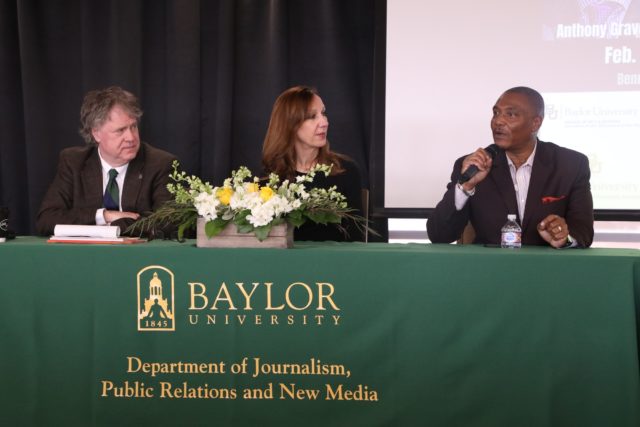By Matt Kyle | Staff Writer
The first day of the 2022 Reconciliation Symposium began at 3:30 p.m. on Monday in Cashion 506 with a panel titled “The Plight of the American Criminal Justice System.”
The symposium was sponsored by the Baylor Department of Journalism and the Baylor National Association of Black Journalists in conjunction with a number of other departments. Day one included the panel discussing historical issues of systemic racism and the criminal justice system and a keynote speaker discussion featuring one of three keynote speakers for the event, Anthony Graves.
Graves is the 138th exonerated death row inmate in America; he was wrongfully convicted and spent 18 years incarcerated before being exonerated and released, and he is now a speaker and author advocating for criminal justice reform.
The other keynote speakers included Mark Osler — a professor of law at the University of St. Thomas and an advocate for clemency and better sentencing — and Jeanne Bishop — a public defender who began advocating for criminal justice reform and mercy toward people convicted of crimes after the murder of her sister’s family.
Robert Darden, a Baylor professor of journalism and one of the organizers of the event, said the topics discussed were important for Baylor students to hear to expose them to viewpoints they wouldn’t otherwise hear.
“So many of our Baylor kids come from a pretty narrow demographic,” Darden said. “If you go into college to have your preconceived opinions and notions reinforced, then you’re probably going to the wrong college. But if you’re going to college because you want to hear and experience everything, this symposium will probably do that as much as anything they will ever encounter at Baylor.”
Osler compared the videotaping of the beating of Rodney King 30 years ago to the videotaping of George Floyd’s death to show the culture of systemic racism in American policing and how even when these events are caught on camera, change is slow to come.
“How sad that 30 years later, we’re still seeing the same thing,” Osler said. “The problem is woven within the culture of law enforcement. If you’ve got a warrant for someone, and you think they’re in an apartment, you don’t have to bust into the door at the break of dawn while everybody’s asleep. They create moments that end in tragedy.”
Bishop encouraged people to approach criminal justice issues through a Christian lens. She said there is a role for every single person to play in the reform of the criminal justice system.
“From my perspective as a Christian, one of the verses that really applies here is when Jesus says to His followers, ‘Come with me; I’ll make you fishers of people,’” Bishop said. “It was meant to require the hands of many people in a boat all pulling together. [The solution] isn’t just education. It’s mental health. It’s housing. It’s social workers. It’s the reparations. This is all hands-on.”
Graves said the problem is “not Black and white” but rather a lack of resources. He said while he was on death row, he saw inmates of all races and ethnicities executed, some of whom were innocent like Graves.
“A lack of resources have allowed innocent men to be executed,” Graves said. “If you trace it back to our home life, we come from broken homes, single-parent homes. We have a lot of mental illness issues. That is not being addressed. We need to address our mental health issues. We need to understand a lot of people coming from poverty. Poverty leads to a lot of crime.”
In the keynote speaker event at Bennett Auditorium, Graves talked to the crowd about his story as a documentary film crew filmed him for an upcoming documentary about him. At 26, Graves was named as an accomplice in a sextuple murder despite being innocent. Graves said he had evidence proving his innocence, and the real killer even used his last moments before being executed to say he lied about Graves’ involvement.
In 2010, after being incarcerated for 18 years, Graves was exonerated and was finally able to return to his children and mother.
Day two of the symposium will begin at 3:30 p.m. on Tuesday with another panel titled “Forgiveness, Reconciliation and Reform of the Criminal Justice System” along with a keynote speaker event at 5:30 p.m. in Bennett Auditorium, this time featuring Osler. Day two will be focused more on issues of reconciliation between victims of crime and criminals and how to repair the criminal justice system.



